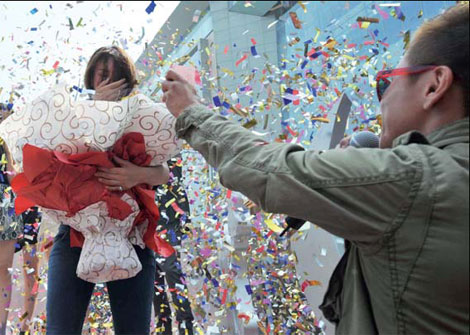Popping the question
Updated: 2011-11-25 07:35
By Charlie Custer (葛亚辉) (China Daily)
|
|||||||||
|
A young man proposes to his sweetheart with a ring and roses. Zhang Bin / For China Daily |
Marriage isn't a joking matter. Before a man proposes in China, he must carefully choose his words
婚姻不是闹着玩的。在中国求婚,尤其要做好准备,谨言慎行。
In China, much of the older generation still recalls arranged marriage; there isn't a long tradition of creative marriage proposals like there is in the West. Traditions vary from region to region and family to family, but often the process involves a formal meeting between the boy (and, if possible, his family) and the girl's family. Depending on how traditional the families are, and the local expectations, dowry payments may be arranged and an official wedding date will be agreed upon, generally no later than a year or so after the engagement.
Often, the timing of this visit is carefully chosen - generally the meeting wouldn't be on the fourth of any month, as the Chinese word for "four" (四 sì) sounds like "death" (死 sǐ). The boy brings gifts for her entire family, and a special gift for her, which tends to be valuable jewelry of some kind. Though it is not necessarily an engagement ring, the placing of the jewelry on her body indicates that the two are officially engaged.
I decided to take my sweetheart to the near-deserted Ice and Snow Festival in Harbin, the far northern city where we met, only days before it closed in March. Surrounded by towering, regal ice sculptures that lit up the night, I got down on one knee - Western-style - and opened the small black box containing a ring I was dreadfully afraid wouldn't fit. "你愿意永远跟我在一起吗? (Nǐ yuànyì yǒngyuǎn gēn wǒ zài yīqǐ ma?)" I asked, "Will you be with me forever?"
That line was carefully chosen. Chinese friends suggested all kinds of lines. "你嫁给我吧!" (Nǐ jià gěi wǒ ba! "Marry me.") sounded a little bit too informal, and "你愿意嫁给我吗?"(Nǐ yuànyì jià gěi wǒ ma? "Will you marry me?") struck me as a little traditional, so I went with something a bit more romantic sounding, but used the verb 愿意 (yuànyì) - it's the same thing couples say when they actually get married: "我愿意。" (Wǒ yuànyì. "I do.")
The downside to the phrasing I chose was that, at first, she didn't realize I was actually asking her to marry me. She jumped into my arms anyway, and then after a moment of silent embrace, asked tentatively: "You're asking me to marry you, right?"
She had accepted my proposal, but I wasn't in the clear yet. For me, it was the day after the proposal that I was really dreading. My new fiancee was taking me to Kedong, a small town about four hours north - yes, north - of Harbin to meet her family. I had spoken with her father on the phone several times before, but I had never met anyone from her family.
She and I arrived in the evening, taking a short three-wheeled cab ride from the bus stop to her family home. Her father was waiting out by the street to greet us. We brought my things inside and almost immediately sat down to dinner. Her mother and several relatives were also there, carrying on conversation as her father ("uncle" to me) kept my glass full of beer and his own full of baijiu. Knowing well the way that northeastern Chinese treat guests, I had told them in advance that I "couldn't" drink baijiu - a small loss of face, perhaps, but I felt it was worth sacrificing a bit of perceived manhood for the pleasure of not being plastered all weekend. I was nervous enough about making mistakes as it was.
Her family noticed the ring pretty quickly, and with a sideways glance at me, she told them: "他已经向我求婚了。" (Tā yǐjīng xiàng wǒ qiúhūn le. "He proposed.") I was expecting a barrage of questions, but they never came, at least not yet. Her family seemed content to pour me drinks and pile food onto my plate as I struggled to keep up, both with the food and the conversation.
I found myself understanding most of the simple questions they asked me, but not being sure how to respond. "Is the kang hot?" her mother asked. I knew that kangs, Northern China's wooden heated beds were supposed to be warm, but were they supposed to be hot? If I said it was hot, would that mean it was too hot? If I said it was warm, would that mean it was too cold? The safest response I could think of was, "It's very comfortable."
Cultural misunderstandings aside, everyone seemed happy - perhaps it was the booze - and I went to bed relieved. "I really like your parents," I told my fiancee as I drifted into slumber.
The next several days passed without event. As our final dinner with her family approached, my fiancee told me that if her parents still didn't ask any questions, I should address the issue of our relationship directly. Specifically, there were three things she felt they needed to hear: first, that I really did love her; second, where we planned to live after we got married, and third, why we hadn't set a date for the wedding yet.
Emboldened by a few stout bottles of Harbin beer, I explained to them in cautious, formal Chinese exactly how I felt about their daughter.
Uncle, Aunt, I have something to say.
Shūshu, āyí, wǒ yǒu huà yào gēn nǐmen shuō。
叔叔,阿姨,我有话要跟你们说。
First, I want to thank you for your hospitality, for letting me stay here and feeding me so well.
Shǒuxiān, wǒ xiǎng xièxiè nǐmen de rèqíng zhāodài, nǐmen ràng wǒ zhù zài zhèlǐ, wǒ yě chī de hěn hǎo.
首先,我想谢谢你们的热情招待,你们让我住在这里,我也吃得很好。
Also, as for the matter of your daughter and I, you don't need to worry any more. I love her very much and am willing to spend my life looking after her.
Zhìyú wǒ hé nǐmen nǚér de shì er, nǐmen bùyòng dānxīn. Wǒ fēicháng ài tā, wǒ yuànyì yòng yībèizi lái hǎohǎo zhàogù tā.
至于我和你们女儿的事儿,你们不用担心。我非常爱她,我愿意用一辈子来好好照顾她。
You may be worried about the fact that we haven't set a date; this is because our jobs are not stable and because my mother would like to meet her before we get married.
Nǐmen kěnéng huì dānxīn wǒmen wèishénme hái méi dìng xià jùtǐ jiéhūn shíjiān, zhè shì yīnwèi wǒmen de gōngzuò hái méi wěndìng xiàlái, érqiě wǒ mǔqīn xiǎng zài wǒ liǎ jiéhūn zhīqián gēn tā jiàn gè miàn, rènshí yīxià.
你们可能会担心我们为什么还没定下具体结婚时间,这是因为我们的工作还没稳定下来,而且我母亲想在我俩结婚之前跟她见个面,认识一下。
If you have any questions you can ask me directly.
Nǐmen yàoshi hái yǒu shénme wèntí kěyǐ zhíjiē wèn wǒ.
你们要是还有什么问题可以直接问我。
Her mother remained silent while her father launched into a longer speech, telling me that the most important thing to him was his daughter's happiness. He wasn't worried about when we got married. He believed I was a good person and was satisfied with the match. As I finished my second (or was it third?) large bottle of beer, he neared the end of a bottle of baijiu.
"When my daughter first told me she was dating a foreigner, there was a level-12 earthquake in our family, I don't mind telling you," he chuckled. "But eventually, I came around."
He handed me another bottle of beer, smiling.
We went to bed drunk and happy - genuinely happy, this time - and boarded the bus back to Harbin early the next morning, satisfied that we were headed home with a blessing, not a knife-wielding-mom story of our very own. It took us almost seven hours to get back - a blustery snowstorm had made the roads quite treacherous - but that didn't matter. For the moment anyway, our worries were behind us and a bright future lay ahead, as we rumbled slowly through the swirling white winds.
Courtesy of The World of Chinese, www.theworldofchinese.com











